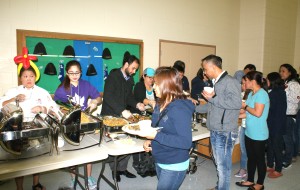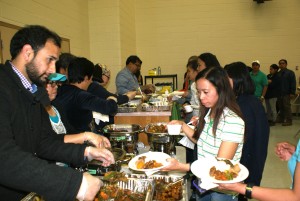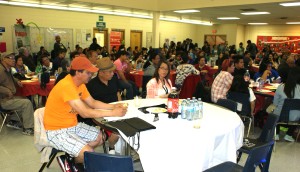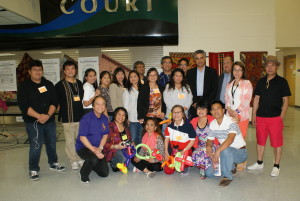‘Salu-salo’ solidarity with Filipino victims of Alberta wildfire
RED DEER, Alberta – With Filipino food galore, a “salu-salo” on Friday, May 20 hosted victims of the ongoing wildfire in Alberta to let them forget their grim experiences for a night and bring to life the spirit of damayan.
Over 200 Filipino evacuees from Fort McMurray attended the event held in the city of Calgary, a seven-hour drive or some 743 kilometers away from the affected area.
Many of the Filipino victims are housed in evacuation sites located in schools in the city, at the University of Calgary, Southern Alberta Institute of Technology, Mount Royal University and Ambrose College.
The evacuees receive food, clothing, personal care items, transit tickets as well as psychosocial support from various sectors and non-government organizations.
The prospect of returning to their community is slated for June 1. However, some evacuees’ reasons for returning may have turned into ashes.
Future is bleak
Roy (not his real name) was at the salu-salo, together with hundreds more evacuees, crowded in the cafeteria-turned-event hall at the Father Lacombe High School.
Now temporarily housed in an evacuation site in SAIT, he fled from Fort McMurray on May 2 with the help of his employer. They drove along with thousands others, past the burning forest trees, communities and buildings.
He requested anonymity because he has been without status in Canada for a year after working under the Temporary Foreign Worker Program since 2009.
“The road was heavy with traffic. People were contacting their loved ones to make sure everyone was safe,” recalls the 35-year-old who works for a fast food company in Fort McMurray. Like most contract workers, Roy left most of his belongings in the apartment he shares with fellow contract workers.
He will return to Fort McMurray just to find out if his belongings escaped the fire, otherwise Roy is unsure if he has a future in what has become his second home in Canada.
The native of Cagayan Valley is one of the many foreign workers hobbled by the progressive cap laid down on employers who had to cut down on the number of TFW employees they hire in recent years.
Roy said the backlog in permanent status applications through the provincial nominee program had invalidated his own application for the current stream. And since his employer could not renew his contract, he chose to remain in Canada to continue working without proper documents.
Estimates of the number of TFWs who were present in the fire area are scarce, but based on the data from Employment and Social Development Canada (ESDC), there were 1,024 positive labor market impact assessment (LMIA) awarded to employers in 2014 in Wood Buffalo, where Fort McMurray is a regional municipality.
LMIA is a federal government certificate allowing employers to hire TFWs.
In the 2011 census by Immigration, Refugees and Citizenship Canada, there were 1,824 TFWs living in Wood Buffalo. Philippines was the top source country for employers in Alberta in 2014.
Comfort, support
Longtime community development worker and Filipina Canadian Marichu Antonio, executive director of Ethno-Cultural Council of Calgary, saw the need to sympathize with the Filipino victims of the wildfire. She heads ECCC, a community-based organization of over 60 culturally diverse groups.
“While many said that their immediate needs for food, temporary shelter and financial aid were being addressed by government agencies, the Red Cross and other aid groups, they also yearned for the comfort of the familiar – Filipino food, community support and connections (damayan),” said Antonio, who was also one of the founders of the Philippine Emergency Response Team (PERT) established in 2006.
Calgary-based PERT took part in several disaster response efforts in the Philippines by supporting the rehabilitation work for victims of the 2006 Ormoc landslide, 2009 tropical cyclone Ondoy and 2013 super typhoon Yolanda.
Antonio said the organizers also looked at assessing the unique challenges Filipino evacuees face. On top of the day-to-day needs, stable housing and future income also topped their list of concerns.
But because many of the evacuees are temporary foreign workers, the victims echoed would-be issues about their status if their present employers are not able to resume business immediately.
Furthermore, with loss of income, there is great concern about not being able to send money home to their families who are relying on them for support, said Antonio.
To date, the non-government organization Temporary Foreign Workers Association in Edmonton City has received more than 400 profiles of Filipino TFWs whose status have become unstable since the wildfire. The profiles are collected to support calls made by advocacy groups for an open permit for TFWs affected by the wildfire.
Economic impact
Antonio said along with assistance in documents lost to the fire for Filipino evacuees, the Philippine government also has to make representations to its Canadian counterparts to provide open work permits to affected evacuees.
“These displaced TFWs need to provide financial support to their dependents in the Philippines. Other Fort McMurray victims – Canadian citizens and permanent residents and their dependents — are getting financial aid from Canadian governments and the Red Cross,” she said.

Abundant Filipino food to help evacuees forget their misfortune even just for a night. JHONG DE LA CRUZ
“The dependents of TFWs who are in the Philippines will not receive the same kind of treatment, although they are economically affected as much,” Antonio added.
For TFWs who have lost their jobs to the fire but whose applications had been received under the Alberta provincial nominee program, their applications are put on hold for up to a year to allow them to find alternative jobs, while those who have received nominations will have their status maintained.
The salu-salo event was supported by five Filipino volunteer chefs, seniors and other Filipino organizations, Zumba dancers, singers and a youth band.
As of press time, the blaze has crossed neighboring Saskatchewan, covering some 2,496 hectares in that province. A total of 16 wildfires are still burning, while some 1, 934 firefighters have been dispatched to bring the fire under control.
The forest fire, now in its fourth week, forced more than 80,000 residents out of their homes. Strong winds have fanned the fire to drag on and cross borders, but cooler temperatures and periodic rains have dampened it, which left 90 percent of Fort McMurray unscathed, the Government of Alberta had reported.
RELATED STORIES
Massive Alberta wildfire expected to burn for months
8,000 Filipinos affected in massive Alberta, Canada wildfire

















